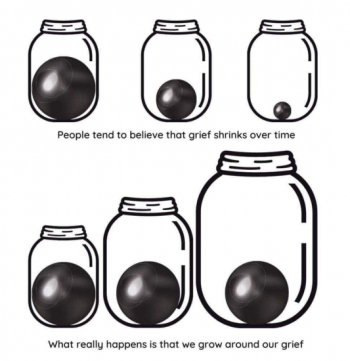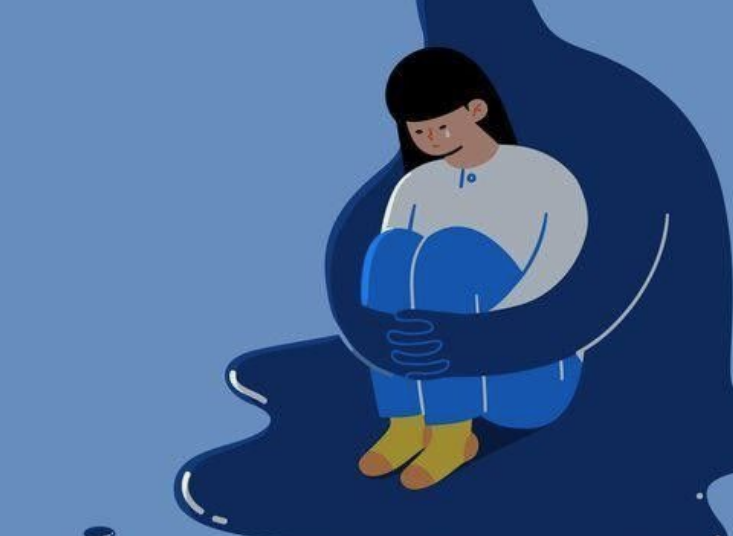The timeline for grief is non-existent.
“It’s not as straightforward as it seems,” explains Bridget McNulty, author of The Grief Handbook: A guide through the worst days of your life.
Before my mom died very suddenly, I assumed that grief – like heartbreak – was linear. It was awful for a while, and then pretty terrible, and then bad, and then better. I wish this was the case… when it comes to grief.
It turns out that grief is not linear at all, but cyclical – it returns in waves that are often as strong as the first waves, knocking you off your feet.
“How often – will it be for always?” writes CS Lewis, “how often will the vast emptiness astonish me like a complete novelty and make me say, ‘I never realized my loss till this moment’? The same leg is cut off time after time.”
Constant Reminders
The hardest part about the early days of grief, I found, were the constant reminders – the triggers lying like landmines in my everyday life. I could start a day feeling fairly positive but then, while picking out a pair of earrings, find a pair my mom had bought me and quickly spiral from there to the fact that she always bought me little gifts, and nobody else does that for me, and nobody else will ever love me like that. Let me tell you: a task that starts with earrings and ends five minutes later in despair is hard to recover from – particularly when it happens numerous times a day.
The trouble is, of course, that we are sensory beings. The smell of your loved one’s perfume, the change in seasons, the taste of a familiar meal – all of these things can be triggers that remind you just how much you’ve lost.
Life grows around grief
I assumed, before I had gone through grief, that the pain would lessen with time – the wound would scab over and no longer hurt when I pressed on it. But while the shock has worn off, it’s not that the loss is any smaller… Simply that life has grown around it. There’s a lovely image of a jar with a black ball of grief inside it. We tend to think the ball shrinks, but really the jar grows bigger. New experiences and layers are added as we live each new day without our loved one.

The passing of time
Strangely, the passing of time has both helped and not helped. My mom died three years ago now, so the acute pain of her passing has eased. I’m able to function in my everyday life without being punched in the stomach and reminded of the shock of my loss. I am used to being a motherless daughter, no matter how reluctantly I carry that title.
But there’s a deeper heartache to it, now. My children are 5 and 7 years old – they were 2 and 4 when my mom died, and the fact that she will never know them as they are now (so awesome! So funny! So cheeky!) and that they won’t have any new memories with her is freshly devastating with each new milestone. A new home, a new job, a new dress: these are all reminders of what I won’t be able to share with my mom.
How to help a friend through grief
So what do we do with this information? If we understand that grief is not linear but can be just as painful months and years later, how do we support our grieving friends? There are a few things that I think are helpful:
- Don’t express surprise if they admit they’re (still) struggling.
I remember distinctly that I wrote an Instagram post 7 months after my mom died, about how it had been a hard grief week. A number of people reached out to find out what had happened – was my dad okay? The fact that I could still be struggling with grief 7 months after my mom died seemed unfathomable and made me feel so alone. - Recognise that certain days will be hard
I didn’t understand, before my mom died, how important the anniversary of a loved one’s death is. Even many years later, it’s a day for reflection and pause, a day that moves at a slower pace and is imbued with sadness. Similarly, their birthday, Mother’s Day / Father’s Day / Valentine’s Day can be triggering, as can Christmas and New Year’s and Easter. Just be extra kind on those days. - Offer a safe space to talk
Grief can be so boring. There is no new information and nothing unique to offer, and yet the pain is often still as fresh and talking it out is so important. If you can offer your friend a safe space to talk about their loved one, and their loss, that is a real gift… Not necessarily an easy one to give, but an invaluable one to receive.
Of course, ‘be kind’ is really the only advice necessary here. We never know what battles someone else is fighting, but for those who are grieving, the battles are often hard to talk about. We are expected to ‘get on with life’ and ‘put on a happy face’, regardless of how we’re feeling. Perhaps, once we understand that there’s no timeline to grief, we can start to put these expectations aside. Wouldn’t that be helpful?
- Bridget McNulty is the author of The Grief Handbook: A guide through the worst days of your life, available at all bookstores. Find out more at www.griefhandbook.com
- Tuesday 30th August is National Grief Awareness Day: an opportunity to talk about grief, and loss, in an open-hearted way, knowing that others are going through the same thing. Follow #griefawareness on social media for more.
- The Grief Course launches on Grief Awareness Day. This online course – offered on a donation basis – is for anyone looking for support as they move through the grief journey.
ALSO SEE:
Feature Image: Pinterest

